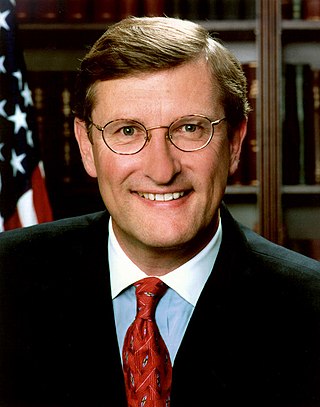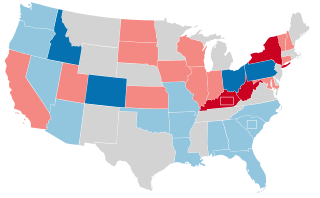
Gaylord Kent Conrad is a former American politician who was a United States Senator from North Dakota. He is a member of the Democratic Party. First elected to the Senate in 1986, he served as chairman or Ranking Member of the Senate Budget Committee for 12 years.

Byron Leslie Dorgan is an American author, businessman and former politician who served as a United States Representative (1981–1992) and United States Senator (1992–2011) from North Dakota. He is a member of the Democratic Party.

The 1998 United States Senate elections were held on November 3, with the 34 seats of Class 3 contested in regular elections. This was seen as an even contest between the Republican Party and Democratic Party. While the Democrats had to defend more seats up for election, Republican attacks on the morality of President Bill Clinton failed to connect with voters and anticipated Republican gains did not materialize. The Republicans picked up open seats in Ohio and Kentucky and narrowly defeated Democratic incumbent Carol Moseley Braun, but these were cancelled out by the Democrats' gain of an open seat in Indiana and defeats of Republican Senators Al D'Amato and Lauch Faircloth. The balance of the Senate remained unchanged at 55–45 in favor of the Republicans.

The 2010 United States Senate elections were held on November 2, 2010, from among the United States Senate's 100 seats. A special election was held on January 19, 2010, for a mid-term vacancy in Massachusetts. Thirty-four of the November elections were for six-year terms to the Senate's Class 3, while other three were special elections to finish incomplete terms. Those 37 November elections featured 19 incumbent Democrats and 18 incumbent Republicans.

The 1968 United States Senate elections were elections for the United States Senate. Held on November 5, the 34 seats of Class 3 were contested in regular elections. They coincided with the presidential election of the same year. The Republicans picked up five net seats in the Senate. This saw Republicans win a Senate seat in Florida for the first time since Reconstruction.

The 1960 United States Senate elections coincided with the election of John F. Kennedy as president on November 8, 1960. The 33 seats of Class 2 were contested in regular elections. A special election was also held on June 28, 1960, for a mid-term vacancy in North Dakota where Democrats flipped a seat to expand their majority to 66–34. As Majority Leader Lyndon Johnson was elected Vice President, Mike Mansfield became the new majority leader.

The 1956 United States Senate elections were elections for the United States Senate that coincided with the re-election of President Dwight D. Eisenhower. The 32 seats of Class 3 were contested in regular elections, and three special elections were held to fill vacancies. Although Democrats gained two seats in regular elections, the Republicans gained two seats in special elections, leaving the party balance of the chamber unchanged.

The 2004 United States Senate election in North Dakota was held on November 2, 2004, concurrent with other elections for president, the United States House of Representatives, and various state and local offices. Incumbent Democratic-NPL U.S. Senator Byron Dorgan won re-election to a third term by a landslide margin of 36.6 percentage points, sweeping every county in the state, even while Democratic presidential nominee John Kerry lost the state by 27.3 percentage points. Despite this landslide victory, as of 2024, this is the last time the Democratic-NPL won the Class 3 Senate seat from North Dakota.

The 1992 United States Senate election in North Dakota was held on November 3, 1992, along with other elections to the United States Senate in other states as well as elections to the United States House of Representatives and various state and local elections. Incumbent Democratic-NPL U.S. Senator Kent Conrad retired, having given a pledge that he would not run for re-election if the federal budget deficit was higher than when he was first elected; however, when the other Senate seat became vacant, he ran in the special election and won. Democratic-NPL U.S. Congressman Byron Dorgan won the open seat.

The 2012 United States Senate election in North Dakota took place on November 6, 2012, concurrently with the 2012 U.S. presidential election, other United States Senate elections, United States House of Representatives elections, and various state and local elections. Incumbent Democratic-NPL Senator Kent Conrad decided to retire instead of running for reelection to a fifth term.

The 1980 U.S. Senate election for the state of North Dakota was held November 4, 1980. The incumbent, Republican Senator Milton Young, was retiring. Republican Mark Andrews defeated North Dakota Democratic-NPL Party candidate Kent Johanneson to fill the vacated seat.
Donna Lou Speer Nalewaja was an American politician and real estate broker.

The state and local elections in North Dakota in 2006 proceeded as follows:

The 2004 United States presidential election in North Dakota took place on November 2, 2004, and was part of the 2004 United States presidential election. Voters chose three representatives, or electors to the Electoral College, who voted for president and vice president.

The 2010 United States Senate election in North Dakota took place on November 2, 2010, alongside other elections to the United States Senate in other states as well as elections to the United States House of Representatives and various state and local elections. Incumbent Democratic Senator Byron Dorgan announced in January 2010 that he would not seek reelection, leading to the first open seat election since 1992. Governor John Hoeven won the seat in a landslide, taking 76.1% of the vote, sweeping every county in the state, and becoming North Dakota's first Republican senator since 1987. Hoeven's 54 point margin of victory was a dramatic and historic shift from the previous election for this seat, when Dorgan won reelection in a 36 point landslide and himself swept every county in the state.

The 1998 United States Senate election in South Dakota was held November 2, 1998. Incumbent Democratic U.S. Senator Tom Daschle won re-election to a third term. As of 2024, this was the last time a Democrat won the Class 3 Senate seat from South Dakota.

A general election was held in the U.S. state of North Dakota on Tuesday, November 2, 2010, with primary elections being held on June 8, 2010.

The 2006 congressional elections in Minnesota were held on November 7, 2006 to determine who would represent the state of Minnesota in the United States House of Representatives.

The 2022 United States Senate election in North Dakota was held on November 8, 2022, to elect a member of the United States Senate to represent the state of North Dakota. Incumbent Republican John Hoeven was first elected in 2010 with 76% of the vote to succeed retiring Democratic–NPL incumbent Byron Dorgan, and won re-election in 2016 with 78.5% of the vote. He ran for a re-election to a third term in office against Democratic-NPL nominee Katrina Christiansen. He also faced State Representative Rick Becker who initially ran as a Republican in the primary but suspended his campaign in August 2022 and instead ran as an Independent.




















